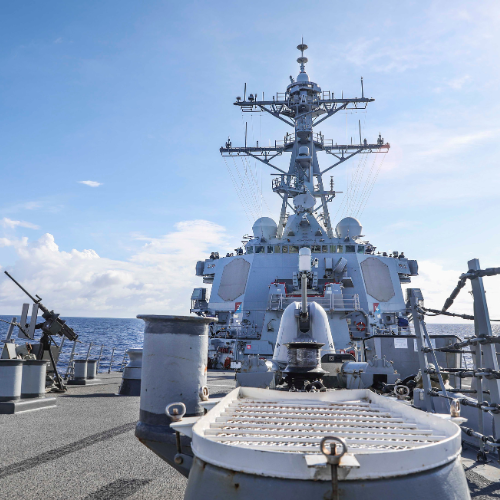In a bold move on Friday, a U.S. Navy destroyer conducted a Freedom of Navigation Operation (FONOP) in the South China Sea, specifically near the Spratly Islands. This operation aimed to challenge what the United States considers unlawful maritime claims made by multiple countries in the region. The USS Preble (DDG-88) sailed within 12 nautical miles of Swallow Reef, a small landmass in the southern part of the Spratlys. The action was part of the U.S. Navy’s ongoing commitment to ensuring international maritime laws are respected and to opposing any unlawful restrictions on freedom of navigation.
A Freedom of Navigation Operation, or FONOP, is a practice conducted by the U.S. military to assert its right to navigate through international waters without restrictions. These operations are carried out when a nation believes that other countries are claiming or enforcing unfair or unlawful rules about the seas and the air above them.
In the case of the South China Sea, several nations, including China, Vietnam, and Taiwan, have made conflicting territorial claims. These claims involve not just the Spratly Islands, but also other areas, including the Paracel Islands. Under international law, countries are allowed to claim a 12-nautical-mile zone of territorial waters around their shores, but these claims do not always align with the United Nations Law of the Sea, which dictates the freedom of passage through international waters.
China’s Deceptive Tactics: The Dangerous Use of Disguised Fishing Boats in the South China Sea
The USS Preble sailed close to Swallow Reef, which is located within the disputed Spratly Islands. Malaysia currently administers the reef, but several countries in the region, including China, Vietnam, and Taiwan, have competing claims over the islands and the waters around them. According to a U.S. Navy statement, these countries have been imposing requirements that foreign military vessels, like the USS Preble, ask for permission or notify them before passing through their territorial waters. The United States disagrees with these rules, as it believes they violate international law.
The statement from the U.S. Navy emphasized that countries like China, Vietnam, and Taiwan do not have the legal right to demand permission or advance notice for military vessels to pass through waters that are considered international under the UN Law of the Sea. By conducting the FONOP, the U.S. Navy made it clear that it would continue to challenge these unlawful restrictions and assert the principle of free passage for military and commercial ships.
Under the United Nations Law of the Sea, warships have the right to pass through another country’s territorial waters as long as they are not threatening the peace or security of that nation. This right, called “innocent passage,” allows foreign ships to travel through waters within 12 nautical miles of a coastline without the need for approval from the coastal state, as long as they do not engage in activities that disrupt the peace.
Tensions in the South China Sea
The South China Sea is one of the most hotly contested regions in the world due to its strategic importance and natural resources. The Spratly Islands, where the USS Preble conducted its FONOP, are claimed by multiple countries, including China, Vietnam, Malaysia, and the Philippines. These islands, however, are mostly uninhabited, and their importance comes from their location along crucial shipping routes and their potential underwater oil and gas reserves.
Power of Drones: U.S. Helps Philippines Monitor South China Sea
The U.S. Navy’s operation was a direct response to what it considers unlawful and excessive maritime claims. China, Vietnam, and Taiwan have been criticized by many nations, including the United States, for attempting to impose control over large parts of the South China Sea, areas that are considered international waters under international law.
While the U.S. regularly conducts these operations to protect freedom of navigation, they often lead to tensions with the nations making the territorial claims. In particular, China has been assertive in its stance over the South China Sea, building artificial islands and military facilities in the region. These moves have led to an increased military presence and heightened tensions, especially with the U.S. Navy conducting FONOPs to counter China’s territorial claims.
The United States views the freedom of navigation through these vital waterways as crucial to global trade, as billions of dollars’ worth of goods pass through the South China Sea each year. The U.S. Navy’s actions serve as a reminder that international waters should remain open and accessible to all nations, regardless of territorial disputes.


